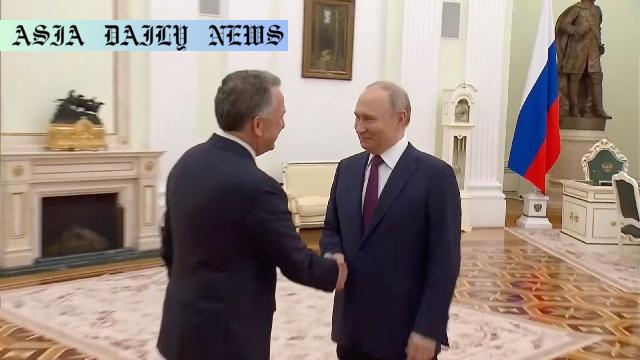Ukraine: US Special Envoy Steve Witkoff engages in a crucial fourth meeting with Russian President Vladimir Putin to negotiate peace.
- Putin and US envoy Steve Witkoff held a crucial fourth meeting seeking a resolution for Ukraine.
- Talks discussed resuming direct negotiations between Russia and Kyiv.
- US and Ukraine resist proposals for recognizing Russia’s annexation of Crimea.
- Ballistic missile attacks highlight escalating tensions amidst talks.

US Diplomatic Efforts to Resolve the Ukraine-Russia Conflict
The diplomatic efforts to end one of the most alarming conflicts of the 21st century, the Ukraine-Russia war, have reached a critical juncture. US President Donald Trump has tasked his special envoy, Steve Witkoff, to directly engage with Russian President Vladimir Putin. The fourth meeting between these two figures took place on Friday, lasting three hours, with discussions centered on fostering peace between the warring nations of Russia and Ukraine. The ongoing war, which has cost tens of thousands of lives and displaced countless individuals, remains a stark reminder of the fragile state of global diplomacy.
Yuri Ushakov, a Kremlin aide on foreign policy, outlined the constructive tone of the discussions. He reported significant steps towards resuming direct negotiations between Russia and Ukraine, signaling a potential thaw in the icy relations. The discussions highlighted a gradual alignment of Moscow and Washington’s positions, perhaps a precursor to larger agreements. As part of these talks, the United States faces growing resistance from Ukraine and European allies over proposals acknowledging Russia’s controversial annexation of Crimea. Such resistance underscores the delicate balancing act the United States must maintain to achieve sustainable peace.
Continued Hostilities Amid Peace Talks
The backdrop of these diplomatic efforts remains violent and tumultuous. A day before the recent talks, Moscow launched devastating missile strikes on Ukraine’s capital, Kyiv, resulting in at least 12 innocent lives lost. These attacks cast a shadow over the negotiations, as they exemplify the continued aggression despite ongoing efforts at diplomacy. Moreover, Ukrainian ministry spokesperson Heorhii Tykhyi raised concerns surrounding the use of ballistic missiles, reportedly equipped with North Korean technology and Western-made components. This revelation has heightened calls for stricter sanctions and renewed scrutiny over global supply chains enabling such warfare technology.
A Collective Call for Unified Responses
Amid this turmoil, Ukraine and European leaders convened separately in London, rejecting any compromises that undermine Ukraine’s sovereignty. The resolve to deny Russia’s annexation of Crimea reflects a shared belief among these nations that any settlement must prioritize Ukraine’s territorial integrity. Their position clashes with the more pragmatic stance the United States appears to be considering, putting additional strain on international alliances. Meanwhile, these layered negotiations indicate the complexities intrinsic to global diplomacy during such high-stakes conflicts.
The path forward will likely require nations to make wrenching compromises. For now, the focus remains on leveraging diplomacy to minimize the suffering and destruction caused by this protracted war. However, continued aggression on the battlefield might sabotage these budding overtures of peace. As global leaders deliberate, the world watches closely, hoping for meaningful resolutions that prioritize humanity over geopolitics.



Commentary
Personal Insights: A Delicate Balancing Act
The ongoing efforts to resolve the Ukraine-Russia conflict reflect the duality of ambition and limitation faced by global diplomacy. Observing the involvement of prominent figures such as US envoy Steve Witkoff and Russian President Vladimir Putin underscores the complexities of high-stakes negotiations. Diplomacy, in essence, is a delicate dance requiring tact, patience, and a willingness to compromise. However, the question remains—at what cost?
The Cost of Sovereignty
One particularly contentious issue, Crimea, stands as a litmus test for integrity in international policy. While the United States explores broader agreements with Russia, Ukraine and its allies, particularly in Europe, seem resolute in protecting the sanctity of its territorial claims. This moral fortitude is commendable, albeit challenging in an environment that increasingly favors “pragmatic” compromises in place of principle. Sovereignty should never be on the negotiation table, as its loss can ripple into future conflicts.
The Geopolitical Ripple Effect
Beyond the immediate concerns of territorial integrity and peace, the conflict has broader implications. As revelations about weapons utilizing North Korean technology and Western components come to light, the crisis also serves as a wake-up call. This points to a breakdown in regulation and accountability on global arms management, demanding immediate rectifications. Similar loopholes in global policies might fuel divisions or set dangerous precedents in conflict zones elsewhere.
In conclusion, the Ukraine-Russia conflict teaches us lessons about diplomacy, integrity, and global governance. It is vital that ongoing negotiations prioritize human lives and long-term peace while rejecting short-term gains tied to dubious compromises. The world awaits, hoping its leaders will rise to meet this challenge with genuine resolve.